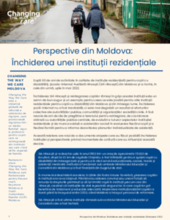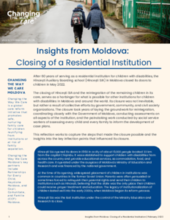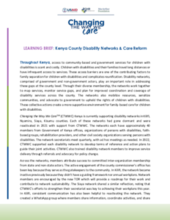Demographic Data:
|
Sources: World Bank, UNDP, DHS 2010-11 |
Displaying 1011 - 1020 of 14347
The report’s objective is to promote the use of these data to make children with disabilities more visible, bringing about a fuller understanding of their life experiences.
Millions of children with disabilities around the globe continue to be left behind, despite the near-universal ratification of the Convention on the Rights of the Child, the call for action embedded in the Convention on the Rights of Persons
Children with disabilities and children on the move represent highly diverse populations living in a broad range of circumstances. But as two of the most marginalized groups of children in the world, there is much they have in common, often-times neglected in data collection, policies and programming. This report examines children’s lives when these two identities intersect.
După 60 de ani de activitate în calitate de instituție rezidențială pentru copii cu dizabilități, Școala-Internat Auxiliară Hîncești (SIA Hîncești) din Moldova și-a închis, în cele din urmă, ușile în mai 2022. Închiderea SIA Hîncești și reint
After 60 years of serving as a residential institution for children with disabilities, the Hîncești Auxiliary Boarding school (SIA Hîncești) in Moldova closed its doors to children in May 2022. The closing of Hîncești SIA serves as a harbinger for what is possible for other institutions for children with disabilities in Moldova and around the world.
A leading judge has excoriated the government and Parliament for a six-year failure to address judicial warnings about a chronic shortage of secure care for children “in extreme crisis”.
This report examines what happens after unaccompanied children have arrived at their European destinations and is based on interviews with key informants, a literature review, and research in three sites (Lebanon, Greece and Germany). What does it mean to integrate into a new society when you are a child on your own? How do they face the challenges of building an identity without their families, process the violence and dangers of their journeys, and face a new situation that may not be as welcoming or straightforward as they had expected?
This web application was developed to allow for the exploration of various scenarios in the field of education, health, and child protection. The application offers a platform for the analysis of historical trends and patterns using a combination of open data and proprietary data shared by the Government of Moldova.
Brief overview of the situation regarding the rights of people with disabilities in Ukraine one year after the beginning of the invasion of Ukraine by Russia.
This learning brief shares learning from Kenya around the barriers that contribute to family separation for children with disabilities and how disability networks are working to create a supportive environment for family-based care for these children.









